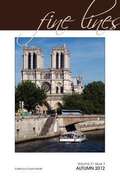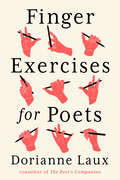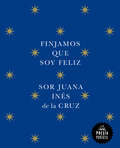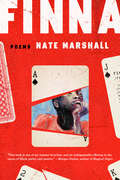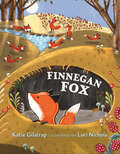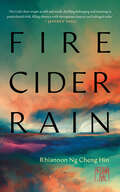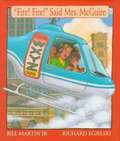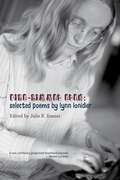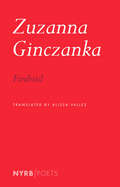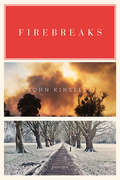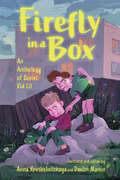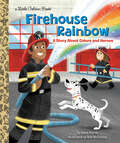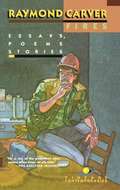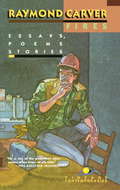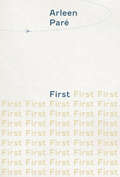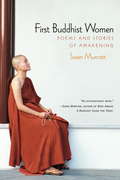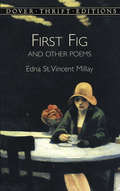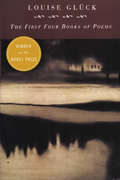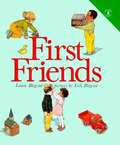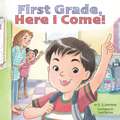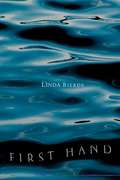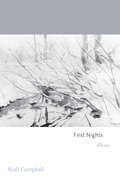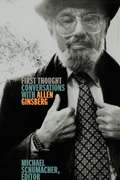- Table View
- List View
Fine Frenzy: Enduring Themes in Poetry (2nd edition)
by Robert Baylor Brenda StokesThis book contains twelve thematic sections arranged alphabetically to give a random mix of traditional, modern, and contemporary poems which reveal the continuity between one generation and the next and most of the new poems are by contemporary or modern poets.
Fine Lines Journal: Autumn 2012 (Volume 21, Issue #3)
by David MartinThis Autumn 2012 Edition is a collection of essays and poetry from writers of all ages.
Finger Exercises for Poets
by Dorianne LauxAn illuminating book of concise craft essays and exercises for poets, from Pulitzer Prize finalist and The Poet’s Companion coauthor Dorianne Laux. From “a poet of immense insight and masterful craft” (Kwame Dawes), Finger Exercises for Poets is an engaging and inspiriting invitation to practice poetry alongside one of its masters. With wide-ranging examples from classic and contemporary poets, Dorianne Laux demystifies the magic of language that makes great poetry and offers generative exercises to harness that magic. She explores the syllable and the line, the use of form, poetic responses to contemporary events and personal experiences, the imaginative leap, and the power of a distinct voice. As she writes in the introduction, “My instrument is the immensity of language.… There are eighty-eight keys on a piano, six hundred thousand words in the English language. The patterns, sequences, and permutations of both are endless. For me, language is another kind of music.… I practice poetry. This book invites you to practice along with me.” Throughout, Laux reminds us that poetry is a practice as much as an art and that poets must hone their language as a musician practicing an instrument.
Finjamos que soy feliz
by Juana Inés de la CruzUna selección de la mejor sor Juana Inés de la Cruz a cargo de Luna Miguel. Pero valor, corazón: porque en tan dulce tormento, en medio de cualquier suerte no dejar de amar protesto. Sor Juana Inés de la Cruz es una de las poetas más importantes de la lengua española. Cerró con broche de oro el Barroco hispánico y es, además, una figura muy seductora: mujer, monja, sabia, defensora de la capacidad intelectual de las mujeres. Sin embargo, como toda autora célebre, Sor Juana ha sido víctima de su fama: todo el mundo la conoce, pero muy pocos la leen. Esta selección a cargo de la también poeta Luna Miguel pone al alcance de todos los lectores la brillantez de los mejores poemas de aquella que fue perseguida por dedicarse en cuerpo y alma no a la religión, sino a la intelectualidad y la escritura. El lector actual descubrirá en estos versos la perspicacia y el desafío que su poesía imperecedera alberga.
Finna: Poems
by Nate MarshallSharp, lyrical poems celebrating the Black vernacular—its influence on pop culture, its necessity for familial survival, its rite in storytelling and in creating the safety found only within its intimacyDefinition of finna, created by the author: fin·na /ˈfinə/ contraction: (1) going to; intending to [rooted in African American Vernacular English] (2) eye dialect spelling of &“fixing to&” (3) Black possibility; Black futurity; Blackness as tomorrowThese poems consider the brevity and disposability of Black lives and other oppressed people in our current era of emboldened white supremacy, and the use of the Black vernacular in America&’s vast reserve of racial and gendered epithets. Finna explores the erasure of peoples in the American narrative; asks how gendered language can provoke violence; and finally, how the Black vernacular, expands our notions of possibility, giving us a new language of hope:nothing about our people is romantic& it shouldn&’t be. our people deservepoetry without meter. we deserve ourown jagged rhythm & our own unevenwalk towards sun. you make happening happen.we happen to love. this is our greatestaction.
Finnegan Fox
by Katie GilstrapA heartwarming story that offers reassurance to anyone who is hesitant to try new things, giving them permission to take the time they need to feel readyTonight&’s the night! It&’s the very first time that Finnegan Fox and his brothers and sisters are allowed to venture out of their den. Everyone is bursting with excitement—except for Finnegan, who feels safer staying inside with Mama. Finnegan can hear his siblings having a great time playing outside, but no matter how much they want him to join them, their invitations fall on too-anxious ears. Then a gust of wind carries in a smell that just might be too delicious to resist. Will Finnegan be able to work up the courage to follow it?
Fire Cider Rain
by Rhiannon Ng Cheng HinPoetry that navigates the science of cold waterways to consider the warmth of the poet’s Chinese-Mauritian family ties Fire Cider Rain is about the limits to which shared cultural and geographic histories can hold a family together. It follows the lives of three Chinese-Mauritian women on the course of dispersing, settling, and rooting over northern landscapes, and the brittle family bonds that tie them to one another and to their home country. Told from the perspective of the youngest of the three women, Fire Cider Rain follows the events leading up to and following the death of her grandmother, an ex-lighthouse keeper and matriarch whose fractured relationship with her own daughter haunts the narrator’s life in soft, painful aftershocks. As she navigates the cold cities and waterways of Southern Ontario, our narrator struggles with conflicting desires to run toward and flee from her island identity, which grows ever distant, ever more difficult to find her way back to. At its core, Fire Cider Rain is a book about parent-child relationships as vessels for cultural identity, and the ways in which expressions of love and non-love within those relationships can rupture sense of place, self, and at times, a collective diaspora. Throughout the book, Ng Cheng Hin explores the geopolitics of island nations, the dilution of family histories over time, and the experience of water as a medium for the cyclical movement of island bodies, stories, and cultures. The Mauritian landscape and waterways of southern Ontario recur through the book as convergence points for its many themes. "In this stunning debut, Rhiannon Ng Cheng Hin weaves wondrous verse across geological spaces that extend from Mauritius to Canada. In this poetry, the Indian Ocean converses with northern landscapes to give voice to the (un)settling of diasporic women in search of rootedness. Water becomes a medium, a metaphor, a rhythm, a motif, and a metamorphosing figure through which memory, loss and mourning become bodies. Rhiannon Ng Cheng Hin's sweeping poetry is infused with dexterous and lavish verse that makes the reader want to live within the nuances of each line. Fire Cider Rain is a dazzling debut!" – Kama La Mackarel, author of ZOM-FAM “Mauritian waters of memory migrate through ‘imperial decay’ and ‘calcic dust’ to the cold northern continent where Rhiannon Ng Cheng Hin’s lustrous poetic telemetry manifests a lexical biogeography of uprootedness—her lyrical ‘I’ the connecting thread between past and future, between mother and moth, grandmother and cyclone, selia lover and terra nullius. Fire Cider Rain erupts as ebb and swell, distilling belonging and meaning in postcolonial drift, filling absence with terraqueous inquiry and salvaged wake.” – Jeffrey Yang, author of Line and Light "In reading Rhiannon Ng Cheng Hin’s poetry, I became immersed within a deep sense memory of why I came to love poetry in the first place. Her attunement to language and cadence vibrates, or as she writes 'love – or recognition, catches in my throat and stings.' Hers is a voice that can make nerve endings sing and one that speaks with such artful earnestness to the difficulties there are in a personal history. Ng Cheng Hin’s poetry is cousin to the spider's web, which belies a kind of vulnerability through its delicate beauty, yet each of its strands contains an exceptional tensile strength." – Liz Howard, author of Letters in a Bruised Cosmos
Fire! Fire! Said Mrs. Mcguire
by Bill Martin Jr.Smoke is rising in the city, but help is on the way. Join the rescue brigade on a wild adventure at the scene of a most unexpected fire! A lively rhyming text, hilarious illustrations, and an outrageous cast of funny females will keep children laughing all the way to the surprise ending.
Fire-Rimmed Eden: Selected Poems (Sapphic Classic)
by Lynn LonidierFire-Rimmed Eden: Selected Poems gathers poems from Lynn Lonidier' s rich and varied collections. Lonidier published five poetry collections Po Tree (1967), The Female Freeway (1970), A Lesbian Estate (1977), Woman Explorer (1979), Clitoris Lost: A Woman' s Version of the Creation Myth (1989), and a posthumous book, The Rhyme of the Ag-ed Mariness (2001). Her poetry links multiple poetic constellations of the 1970s and 1980s demonstrating linguistic innovations and radical reconfigurations sexuality and gender.The poems of Fire-Rimmed Eden are in conversation with narrative impulses from the feminist and lesbian poetry movements of the 1970s and 1980s, including work by Judy Grahn, Audre Lorde, Adrienne Rich, and others, as well as experimental poetic impulse from the same period found in work by Robert Duncan (Duncan' s partner Jess gave the cover art for A Lesbian Estate), Lyn Hejinian, Carla Harryman, and Etel Adnan. Some of Lonidier' s work is concrete in the spirit of May Swenson' s Iconographs while other poems are performative like Bay area poets Pat Parker and Jerome Rothenberg.Previously completely out of print, Lonidier' s poetry is ripe for a new generation of readers. Fire-Rimmed Eden assembles a robust selection of Lonidier' s work introduced by Sinister Wisdom editor and publisher Julie R. Enszer. Rich and diverse, visually and aurally exciting, boldly experimental and intellectually provocative, Lonidier' s poetry is imbued with wit, humor, originality, and play.
Firebird
by Zuzanna GinczankaEnergetic, formally audacious poems by a recently rediscovered Polish writer, shining examples of art as resistance.Zuzanna Ginczanka&’s last poem, &“Non omnis moriar..." (&“Not all of me shall die&”), written shortly before her execution by the Nazis in the last months of World War II, is one of the most famous and unsettling texts in modern East European literature: a fiercely ironic last will and testament that names the person who betrayed her to the occupying authorities as a Jew, it exposes the hypocrisy at the heart of Polish nationalist myths.Ginczanka&’s linguistic exuberance and invention—reminiscent now of Marina Tsvetaeva, now of Marianne Moore or Mina Loy—are as exhilarating as the passionate fusion of the physical world and the world of ideas she advocated in her work. Firebird brings together many of Ginczanka&’s uncollected poems and presents On Centaurs, her sole published book, in its entirety.
Firebreaks: Poems
by John KinsellaA follow-up to the critically acclaimed Jam Tree Gully, Firebreaks records life and ecology in Western Australia. Known for a poetry both experimental, “activist,” and lyrical that reinvents the pastoral, John Kinsella considers his and his family’s life at Jam Tree Gully, in the Western Australian wheatbelt, and his deeply felt ecological concerns in this new cycle of poems about place, landscape, home, and absence. Part One, “Internal Exile,” explores issues of departure and return as well as alienation in Jam Tree Gully. Part Two, “Inside Out,” reevaluates how Kinsella and his family deal with ideas of “space” and proximity while also looking out into the wider world. How do we read an ecology as refuge? What lines of communication with the outside world need to be kept open? As Paul Kane observed in World Literature Today, “In Kinsella’s poetry . . . are lands marked by isolation and mundane violence and by a terrible transcendent beauty.”
Firefly in a Box: An Anthology of Soviet Kid Lit (Cultures of Childhood)
by Anna Krushelnitskaya Dmitri ManinContributions by Marina Balina, Sibelan Forrester, Anna Krushelnitskaya, Dmitri Manin, Svetlana Maslinskaya, Ainsley Morse, and Serguei Alex. OushakineIn Firefly in a Box: An Anthology of Soviet Kid Lit, translators Anna Krushelnitskaya and Dmitri Manin present a hybrid scholarly and literary volume of popular Russian-language Soviet children’s texts alongside essays that outline the significance and meanings behind these popular texts. The selection features both poetry and short prose, all of which are instantly recognizable to a Soviet native, and all of which hold cultural currency, potency, and valence similar to popular children’s literature in the United States, such as Green Eggs and Ham, Curious George, or Make Way for Ducklings. These texts have either never been translated into English before or appear in all-new translations, literary rather than literal; the featured original Soviet illustrations are reprinted for the English-reading market for the first time. Alongside the translations themselves is a scholarly component that guides Anglophone readers to experience mainstays of Soviet children’s writing. Essayists investigate literary material and perspectives using a broad range of approaches and methodologies applied to Soviet children’s literature. Topics include the Soviet literary canon, the beginning and evolution of Soviet children’s literature in the 1920s and 1930s, interactions between literary texts for children and folklore, and the interplay between Soviet and British children’s poetry.
Firehouse Rainbow: A Story About Colors and Heroes (Little Golden Book)
by Diana MurrayA rhyming Little Golden Book that teaches colors in an exciting story about firefighters doing their job and having fun!This rhyming Little Golden Book follows a team of diverse firefighters who bravely save the day—and still manage to celebrate their captain's birthday. Young children will love pointing out the colors featured on each page of this fun, fast-paced story: Quickly! Stretch the yellow hose!Start the hydrant. There it goes! Aim the rushing stream of blue. Spray the roof and windows, too.
Fires: Essays, Poems, Stories
by Raymond Carver"Fires," a disparate collection of stories and poems, show the enormous talent of Raymond Carver beginning to take hold as this is his most revealing book.
Fires: Essays, Poems, Stories (Vintage Contemporaries)
by Raymond CarverMore than sixty stories, poems, and essays are included in this wide-ranging collection by the extravagantly versatile Raymond Carver. Two of the stories—later revised for What We Talk About When We Talk About Love—are particularly notable in that between the first and the final versions, we see clearly the astounding process of Carver&’s literary development.
First
by Arleen ParéGovernor General’s Award–winning poet Arleen Paré combines the story of two first best friends with questions of the mystery of cosmic first cause. The poems in First, Arleen Paré’s seventh collection, search for a long-lost first friend. They conjure the subtle layers of meaning in that early friendship to riff on to a search for how we might possibly understand the primal First: the beginnings of the cosmos that contains our own particular lives, beginnings and longings. This layered evocation of the past—of childhood in 1950s Dorval, “a green mesh of girls friendships and fights”—and the intensity of the desire to know, give First its haunting beauty. “[T]he word though old fashioned,” Paré writes, “is whence . . . unconditioned origins” when “no worthy question is ever answered on the same plane that it was asked; how to frame the question not knowing the plane on which I must ask it.” “Arleen Paré’s First is an intriguing Gertrude Stein as Nancy Drew mystery. Using prose poem narrative and an intense syntactic poetics, Paré discovers the cracks in memory as she documents the search for her first best friend. The cracks in this lyrical puzzle are heightened by a very active and assertive poetic language that compels as it decodes the investigation of childhood memory and desire. The writing in First demonstrates a powerful juxtaposition of the continuous present with the continuous past.” —Fred Wah “This brilliant collection revolves around firsts, especially a first friend, ‘the impress of her never gone.’ So too with these poems—tough, sweet and poignant, so surely rendered and musically rich—the impress of these poems never gone.” —Lorna Crozier
First Buddhist Women
by Susan MurcottFirst Buddhist Women is a readable, contemporary translation of and commentary on the enlightenment verses of the first female disciples of the Buddha. Through the study of the Therigatha, the earliest-known collection of women's religious poetry, the book explores Buddhism's 2,600-year-long liberal attitude toward women. Utilizing commentary and storytelling, author Susan Murcott traces the journey of wives, mothers, teachers, courtesans, prostitutes, and wanderers who became leaders in the Buddhist community, acquiring roles that even today are rarely filled by women in other, patriarchal religions.
First Fig and Other Poems (Dover Thrift Editions: Poetry)
by Edna St. MillayFrom the bohemian outpost of Greenwich Village during the Jazz Age, Edna St. Vincent Millay (1892–1950) sounded a clarion call for the impassioned youth of her generation. Her rare mixture of clever cynicism and wistful tenderness captivated readers, who reveled in the jubilant defiance of such poems as the title piece of this collection, "First Fig": "My candle burns at both ends;/It will not last the night;/But ah, my foes, and oh, my friends — /it gives a lovely light!"Their brilliance undimmed by the passage of time, these gemlike verses continue to dazzle poetry lovers. This new anthology represents the quintessential Edna St. Vincent Millay, comprising 67 poems from two of her most popular works, A Few Figs from Thistles and Second April. Its contents include such well-known and much-studied poems as "Recuerdo" and "The Philosopher," along with an abundance of sonnets, a genre in which the Pulitzer Prize–winning poet excelled.The perfect introduction for those as yet unacquainted with one of the most distinctive voices of 20th-century poetry, this volume also offers a high-quality, inexpensive treasury of favorite Millay works for devotees of her verse.
First Four Books Of Poems
by Louise GluckWinner of the Nobel Prize in LiteratureThe First Four Books of Poems collects the early work that established Louise Gluck as one of America's most original and important poets. Honored with the Pulitzer Prize for The Wild Iris, Gluck was celebrated early in her career for her fierce, austerely beautiful voice. In Firstborn, The House on Marshland, Descending Figure, and The Triumph of Achilles, which won the National Book Critics Circle Award for Poetry, we see the conscious progression of a poet who speaks with blade-like accuracy and stirring depth. The voice that has become Gluck's trademark speaks in these poems of a life lived in unflinching awareness. Always she is moving in and around the achingly real, writing poems adamant in their accuracy and depth. Their progression is proof of her commitment to change; with her first four books of poetry collected in a single volume, Louise Gluck shows herself happily "used by time."
First Friends
by Lenore BlegvadThis rhyming book shows very young children as they begin to make friends. Picture descriptions are included.
First Grade, Here I Come! (Here I Come!)
by D.J. SteinbergThe funny follow-up to Kindergarten, Here I Come!First grade -- it's the big time! After all, it's a real honest to goodness grade. In verses that are both funny and full of heart, D.J. Steinberg celebrates big and small moments, ones that all young "scholars" will relate to -- baby teeth that won't fall out, choosing the perfect library book, celebrating Pajama Day, and wrangling with the mysteries of spelling. From the first day of school to the last, this engaging anthology is essential reading for all soon-to-be first graders.
First Hand
by Linda BierdsMacArthur fellow Linda Bierds probes the borders of science and faith in a volume that takes this prizewinning poet to a new level of achievement. The ghost of the good monk Gregor Mendel haunts these poems as they trundle through the centuries, swaying from wonder to foreboding and resting most often on the fault line of science, where human achievement brings both praise and disquietude. These thirty linked poems display Linda Bierds at her best: strong, visceral, playful, infused with wonder and color, they both amaze and delight. Bierds's imagery has always been powerful, but here, the subtlety of its permutations throughout the volume is nothing short of breathtaking. Her treatment of substance and insubstantiality, of the material world and "the hummocks of naught"-the gaps filled perhaps by faith, perhaps by scientific progress-adds depth of meaning to the text, and her rich language sounds in the mind's ear to startling effect. First Hand proves yet again that Linda Bierds is "a poet of magnitude" (Harold Brodkey). It is a book of wonders, a wondrous book
First Indian on the Moon
by Sherman Alexie"A young writer who is taking the literary world by storm...a superb chronicler of the Native American experience.. an overwhelmingly exciting voice...he is a master of language, writing beautifully, unsparingly and straight to the heart."
First Nights: Poems
by Niall CampbellThe Scottish poet Niall Campbell's first book, Moontide, won the Edwin Morgan Poetry Prize, the largest such prize in the United Kingdom, was named the Saltire Scottish First Book of the Year, and was shortlisted for both the Fenton Aldeburgh and Forward prizes for best first collection. First Nights--which includes all the poems in Moontide and sixteen new ones--marks the North American debut of an exciting new voice in British poetry. First Nights offers vivid descriptions of the natural world, and the joy found in moments of quiet, alongside intimate depictions of new parenthood. Campbell grew up on the remote, sparsely populated islands of South Uist and Eriskay in Scotland's Outer Hebrides, and First Nights is filled with images of the islands' seascapes, myths, wildlife, and long, dark winters. But the poems widen beyond their immediate locations to include thoughts on sculpture and mythology, Zola and Dostoevsky, and life in English cities and French villages. In the poems on early fatherhood, the geography shifts from coastal stretches to bare, dimly lit rooms. Stripped back, honest, and immediate, these poems capture moments of vulnerability, when the only answer is to love.Combining skilled storytelling, precise language, an allegiance to meter and form, and a quiet musicality, these poems resonate with silence and song, mystery and wonder, exploring ideas of companionship and withdrawal, love, and the stillness of solitude. The result is a collection that promises to be a classic.
First Thought: Conversations with Allen Ginsberg
by Michael Schumacher&“The way to point to the existence of the universe is to see one thing directly and clearly and describe it. . . . If you see something as a symbol of something else, then you don't experience the object itself, but you're always referring it to something else in your mind. It's like making out with one person and thinking about another.&” —Ginsberg speaking to his writing class at Naropa Institute, 1985With &“Howl&” Allen Ginsberg became the voice of the Beat Generation. It was a voice heard in some of the best-known poetry of our time—but also in Ginsberg&’s eloquent and extensive commentary on literature, consciousness, and politics, as well as his own work. Much of what he had to say, he said in interviews, and many of the best of these are collected for the first time in this book. Here we encounter Ginsberg elaborating on how speech, as much as writing and reading, and even poetry, is an act of art.Testifying before a Senate subcommittee on LSD in 1966; gently pressing an emotionally broken Ezra Pound in a Venice pensione in 1967; taking questions in a U.C. Davis dormitory lobby after a visit to Vacaville State Prison in 1974; speaking at length on poetics, and in detail about his &“Blake Visions,&” with his father Louis (also a poet); engaging William Burroughs and Norman Mailer during a writing class: Ginsberg speaks with remarkable candor, insight, and erudition about reading and writing, music and fame, literary friendships and influences, and, of course, the culture (or counterculture) and politics of his generation. Revealing, enlightening, and often just plain entertaining, Allen Ginsberg in conversation is the quintessential twentieth-century American poet as we have never before encountered him: fully present, in pitch-perfect detail.

